Sprouting chickpeas
Sprouting chickpeas helps to reduce controversial antinutrients that supposedly inhibit the absorption of important minerals from your food; if you are intent on minimising your reliance on meat for protein this may be an important step.
Before any seed will grow in the garden or a pot, it will send out a tiny shoot that goes looking for light, and then turns green; roots will appear and it is ready to turn into a plant.
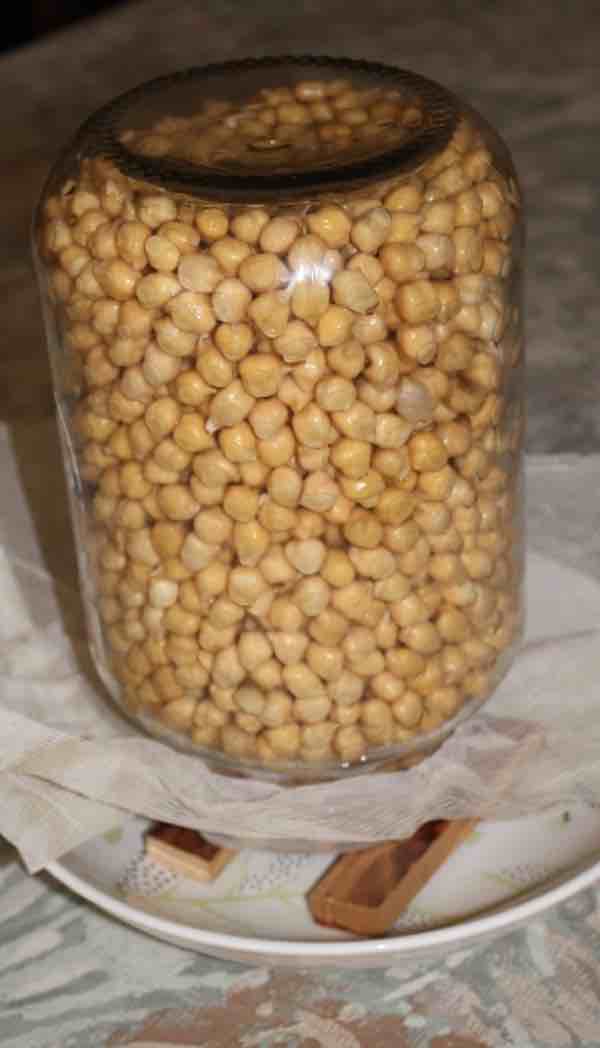 Sprouting chickpeas
Sprouting chickpeasThis page was last updated by Bernard Preston on 3rd April, 2021.
As a general rule, sprouted seeds contain even more vitamins and certain phytochemicals. For example, fava beans contain twice as much levodopa and carbidopa after sprouting(1).
That is hugely important for those suffering from Parkinson's disease, and reliant on this legume for their medication.
In general sprouted seeds contain more vitamins, and especially C and some of the B complex. In particular, provided you use unchlorinated spring or rain water for rinsing them, they will be largely free of toxic chemical-pesticides and residues of medicines, for example.
That alone is a good reason for sprouting chickpeas.
I confess to being unconvinced of the seriousness of so-called antinutrients like lectins that do in part inhibit the absorption of certain minerals from your food; in comparison with their vital role in providing us with more vegetable protein, I consider the risk to be inconsequential.
It is just an anecdote, but recently when donating blood, I was told my iron levels are very good; that despite eating little red meat and reliant on fish and fowl, and vegetables for minerals. Consuming huge amounts of nuts, seeds and legumes has certainly done my haemoglobin no harm.
However, we can reduce these potential risks by first soaking, and then secondly sprouting our legumes; the B-vitamins are better retained also[2].
Sprouting chickpeas
Sprouting chickpeas makes an even better hummus; it's a basic food in Middle Eastern countries using primarily garbanzo beans, as they are known in the USA, and a sesame seed paste; it thus contains all the essential amino acids. Methionine and lysine are the problem-children for vegans.
Step one:
Place a couple pounds of dried chickpeas into a bucket and fill near the top with unchlorinated water; toss in a couple slices of lemon to acidify the liquid.
Leave it to stand for 24 hours, rinsing several times, and making sure the chickpeas remain covered with water; you'll be surprised how much they absorb.
Step 2:
Place your chickpeas in a large glass bottle with a wide neck; cover it with gauze and use two rubber bands to secure it in place. Invert the jar in a wide shallow bowl with two sticks under the mouth so that any water can drain out.
Fill the bottle with water at least once a day, preferably two or three times if you are concerned about phytates, swish it about and again invert it again.
At about the third or fourth day tender young shoots will start to appear.
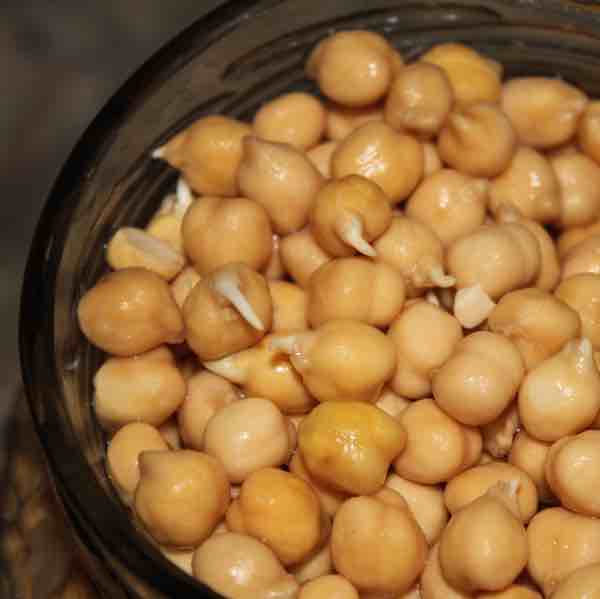 The first sprouts
The first sproutsI am now ready to pressure cook our sprouting chickpeas.
Step 3:
Now is the time to pressure cook your sprouting chickpeas for about half an hour.
Place them in the pressure-cooker, cover with boiling water as they continue to expand, and bring them up to 2.
Rinse several times using a colander after the pressure dropped and they have cooled, allow to dry, and then freeze them in small packets; you'll have them instantly available to make hummus, soup, falafel, chickpea burgers or to thicken your stews.
Try to avoid cornstarch for thickening; it has an extremely high glycemic index; it's not healthy stuff.
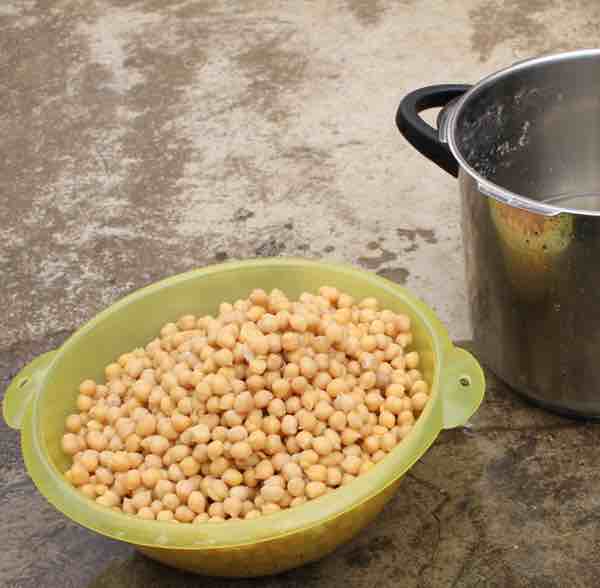 Draining sprouted chickpeas
Draining sprouted chickpeasThen you will have frozen sprouting chickpeas instantly ready.
Read here for more about freezing chickpeas. Reusing these bags oddly is part of our philosophy to wean off plastic.
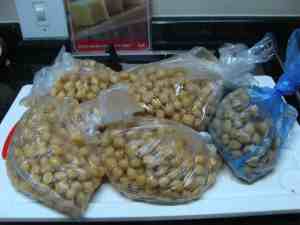 Freezing chickpeas
Freezing chickpeasThis whole process may seem tiresome and boring to you. I make no apology; you either take time preparing nutritious food for your family, or you will spend ten times as much consulting doctors and purchasing expensive drugs with nasty side effects.
Chickpeas are a rich source of minerals such as iron and calcium, so you would want to minimise the effect of the antinutrients that inhibit their absorption; soaking, rinsing and sprouting chickpeas is the solution; some go further and ferment them.
The material expressed on this page is gleaned from the nutritional and environmental literature; it is clearly referenced. A plain distinction is made between the author's opinion and that which is scientifically proven. When in doubt consult your health professional.
To suggest a correction or clarification, write to Dr Bernard Preston here. Contact.
If you are diabetic, or on the way with a raised HbA1c that measures the average level of your blood glucose over several months, then I recommend you use a glucometer to measure your sugar before a sprouting chickpea rich meal, 30, 60 and 120 minutes later; four little pricks on your fingers.
Since I am prediabetic I do it all the time, and hummus in the context of whole meal does nothing abnormal to my blood glucose; yours could be different. In general diabetics respond well to a diet rich in chickpeas; so do the obese as they supply satiety; you won't feel famished at 11 o'clock and reach for a candy bar or cola.
Chickpeas are the very richest source of vitamin B6. Half a cup will provide a quarter of your need for lysine, an amino acid that is difficult for many poor people, and those on a crappy diet, to get enough of.
Useful links
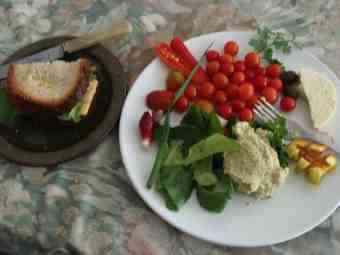 Salad with hummus
Salad with hummusIn short these amazing legumes are a cheap and simple way of improving your health; we enjoy at least a couple pounds per month, for two people, mostly as hummus that we have daily with a large green salad.
Do not get me wrong; we are not vegetarians but we are trying to limit our red meat consumption.
Newsletter
Our newsletter is entitled "create a cyan zone" at your home, preserving both yourself and Mother Earth for future generations; and the family too, of course. We promise not to spam you with daily emails promoting various products. You may get an occasional nudge to buy one of my books.
Here are the back issues.
- Lifestyle and ideal body weight
- What are ultra-processed foods?
- Investing in long-term health
- Diseases from plastic exposure
- Intensive lifestyle management for obesity has limited value
- A world largely devoid of Parkinson's Disease
- The impact of friendly bacteria in the tum on the prevention of cancer
- There's a hole in the bucket
- Everyone is talking about weight loss drugs
- Pull the sweet tooth
- If you suffer from heartburn plant a susu
- Refined maize meal and stunting
- Should agriculture and industry get priority for water and electricity?
- Nature is calling
- Mill your own flour
- Bake your own sourdough bread
- Microplastics from our water
- Alternative types of water storage
- Wear your clothes out
- Comfort foods
- Create a bee-friendly environment
- Go to bed slightly hungry
- Keep bees
- Blue zone folk are religious
- Reduce plastic waste
- Family is important
- What can go in compost?
- Grow broad beans for longevity
- Harvest and store sunshine
- Blue zone exercise
- Harvest and store your rainwater
- Create a cyan zone at your home
Chickpeas are the world's favourite protein, and for good reason. They are relatively cheap, have zero cholesterol and plenty of 'resistant starch'. Instead of giving an instant surge in blood sugar, the carbohydrate is fermented largely in the large intestine producing short chain fatty acids instead of glucose.
They are also the richest vitamin B6 food, one of the four that when deficient contribute to the rapid progression of frailty in the elderly.
- Simultaneous Determination of Levodopa and Carbidopa from Fava Bean, Green Peas and Green Beans
- The effect of cooking, autoclaving and germination on the nutritional quality of faba beans. Web: https://www.sciencedirect.com/science/article/abs/pii/030881469500024D
When browsing use right click and Open Link in New Tab, or you may get a bad gateway signal.
Did you find this page interesting? How about forwarding it to a friendly book or food junkie? Better still, a social media tick would help.
Address:
56 Groenekloof Rd,
Hilton, KZN
South Africa
Website:
https://www.bernard-preston.com